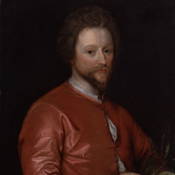
John Fletcher
Playwright
Biography
John Fletcher
John Fletcher was a prominent Jacobean playwright who emerged as William Shakespeare’s successor as the main playwright for the King’s Men (formerly known as the Lord Chamberlain’s Men).
Fletcher was born in 1579 and was one of seven siblings. His father was Bishop of London and chaplain to Elizabeth I, however he fell out of favor shortly before his death and the family’s finances plummeted into debt. After his father died in 1596, Fletcher was brought up by his uncle. Fletcher first appeared in records as a working playwright in 1606, when he began writing for the Children of the Queen’s Revels (the choristers for the Chapel Royal). Early in his career, he lived and worked with the playwright, Francis Beaumont and the pair wrote as a duo for the King’s Men. While working for the King’s Men, Fletcher began to collaborate with Shakespeare, notably on Henry VIII and The Two Noble Kinsmen. He also wrote his own play, The Woman’s Prize, or the Tamer Tamed, which was a sequel to The Taming of the Shrew. Modern scholars believe that Fletcher’s influence played an important role in the style and development of Shakespeare’s late romances.
Following Shakespeare’s death, Fletcher wrote solely for the King’s Men, continuing to collaborate with popular playwrights of the time, including Philip Massinger who became the new house playwright following Fletcher’s death. The final play to be written by Fletcher alone, Rule a Wife and Have a Wife, was staged by the King’s Men a year prior to his death in 1625. Fletcher is believed to have died of the plague and was buried in Southwark.
Shows
Shows associated with John Fletcher
Monologues
Monologues from shows associated with John Fletcher
Scenes
Scenes from shows associated with John Fletcher
Learning Modules
Learning modules associated with John Fletcher
Additional Information
N/A